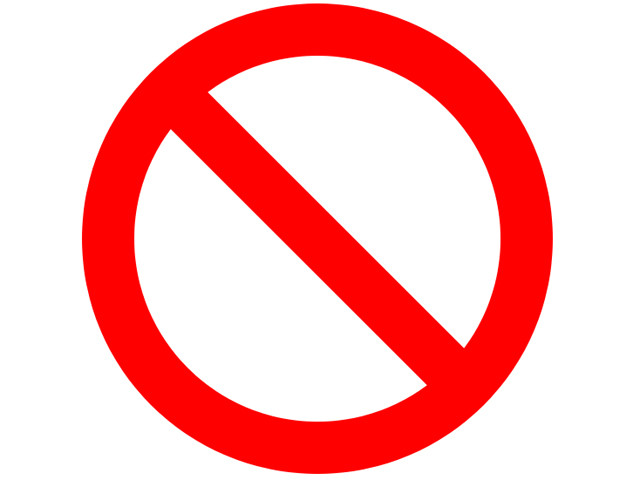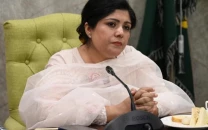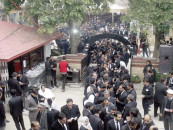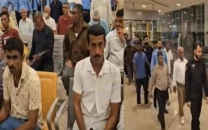Counter-terrorism strategy: The impact of ‘banning’ an organisation
Analysts believe bans, raids and arrests are merely for show.

During a Senate session last week, Interior Minister Rehman Malik inadvertently highlighted the issues with Pakistan’s counter-terrorism strategy.
In response to a question about bans on ‘religious and welfare organisations’, Malik told the Senate that only four groups have been banned over the past three years for their involvement in terrorism.
The answers to other questions revealed what the ‘impact’ of these bans has been. Over 8,000 people were injured and 3,169 were killed in 2,148 terrorist attacks during 2008-2010, excluding the Federally Administered Tribal Areas (Fata).
There are also issues with prosecuting suspects – Malik said 352 of the 606 suspects of terrorist attacks were acquitted by the courts in the same time period.
Well-known organisations were first banned in the early 2000s, but others remained off the radar. Al Qaeda was banned in 2003, two years after the 9/11 attacks, and the Tehreek-i-Taliban Pakistan was banned in 2008. Religious groups who fundraise for militant organisations or groups like Jundullah – which Malik blamed for the Ashura attack in Karachi in 2009 – did not make the list.
Banning organisations does not signal an end to their activities. The government has previously claimed that thousands of activists of banned organisations are being monitored and have been placed on the fourth schedule of the Anti-Terrorism Act (ATA).
In its assessment of the security situation in 2010, the Pakistan Institute of Peace Studies stated, “Better coordination among intelligence agencies, capacity building of law enforcement agencies, curbs on terrorism financing and, most importantly, adequate measures to prevent banned militant groups from operating across the country remained persistently lacking.”
“The bans have had no major impact,” says analyst Imtiaz Gul. “Lashkar-e-Taiba (LeT) and Jaish-e-Mohammad have continued their activities under different names. The government has not banned Jamaatud Dawa (JuD), even though the United Nations has banned it. There is a tacit acceptance of their activities.”
According to the ATA, when an organisation is banned, its accounts are frozen, its literature and digital material is seized and the publication of literature, issuing statements to the press or addressing public gatherings is banned. The organisation has to submit income and expenditure accounts for its political and social welfare activities and disclose funding sources to the government.
Last year, five armed groups in Balochistan were banned, which has not served to quell the insurgency in the province. Banned organisations openly operate with new aliases, fundraise and channel funds, distribute literature and run charity wings. Their websites, statements and videos are easily accessible.
While the government did ban organisations again which had regrouped with new names, this does not appear to be a uniform policy. JuD operates openly as the Falah-i-Insaniyat Foundation and has at least seven other aliases. The US added the foundation to its list of blacklisted organisations in 2010, recognising that LeT used the name to evade scrutiny.
Since the bans are not effective, financing and recruitment continues. According to a US embassy cable released by WikiLeaks, LeT’s annual military operations budget was Rs365 million. A suicide bomber recently arrested in Dera Ghazi Khan revealed that over 400 suicide bombers were being trained in North Waziristan.
Banning an organisation is a first step, which needs to be followed up by a comprehensive strategy and enforcement. But while the bans, raids and arrests are loudly touted as Pakistan’s commitment to combating terrorism, analysts believe they are merely for show, given how these ‘banned groups’ work and recruit openly.
Outlawed entities
2001
August 14, 2001 Lashkar-e-Jhangvi
August 14, 2001 Sipah-e-Mohammad Pakistan
2002
January 14, 2002 Jaish-e-Mohammad
January 14, 2002 Lashkar-e-Taiba
January 14, 2002 Sipah-e-Sahaba Pakistan
January 14, 2002 Tehrik-e-Jafria Pakistan
January 14, 2002 Tehrik-e-Nifaz-e-Shariat-e-Mohammadi
January 14, 2002 Tehrik-e-Islami
January 14, 2002 Sunni Tehrik (Watch list)
2003
March 17, 2003 Al Qaeda
November 15, 2003 Millat-e-Islamia Pakistan
November 15, 2003 Khuddamul Islam
November 15, 2003 Islami Tehrik Pakistan
November 20, 2003 Jamiatul Ansar
November 20, 2003 Jamiatul Furqan
November 20, 2003 Hizbul Tehrir
2004
October 27, 2004 Khairun Naas International Trust
2006
April 7, 2006 Balochistan Liberation Army
August 21, 2006 Islamic Students Movement of Pakistan
2008
January 30, 2008 Lashkar-e-Islam
January 30, 2008 Ansarul Islam
January 30, 2008 Haji Namdar group
August 25, 2008 Tehrik-e-Taliban Pakistan
Source: National Assembly Question & Answers session, August 5, 2009 – na.gov.pk
Jamaatud Dawa (JuD), Al Akhtar Trust and Al Rashid Trust were enlisted under the United Nations Security Council Resolution 1267 on December 10, 2008, but it is unclear if they are officially banned in Pakistan. According to an old list of banned organisations, JuD was banned in 2003. The UN Consolidated List includes organisations based in Pakistan, or which have/had offices in the country: the alHaramain Foundation, Benevolence International Foundation, Global Relief Foundation, Harkatul Jihad alIslami, Rabita Trust, Jamiat Ihia alTurath alIslamiya, Ummah Tameer-e-Nau and the Wafa Humanitarian Organisation.
In September 2010, Interior Minister Rehman Malik announced that five armed groups in Balochistan had been banned: the Balochistan Liberation Army, Baloch Liberation Front, Baloch Mussalah Difaah Tanzeem, Baloch Republican Army and the Baloch Liberation United Front.
Published in The Express Tribune, April 12th, 2011.



















COMMENTS
Comments are moderated and generally will be posted if they are on-topic and not abusive.
For more information, please see our Comments FAQ